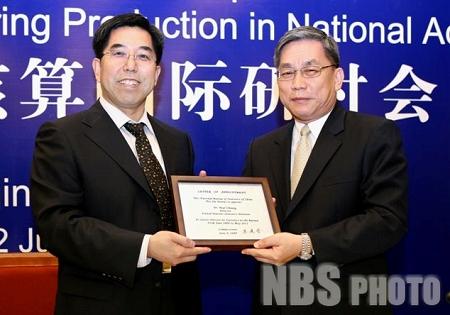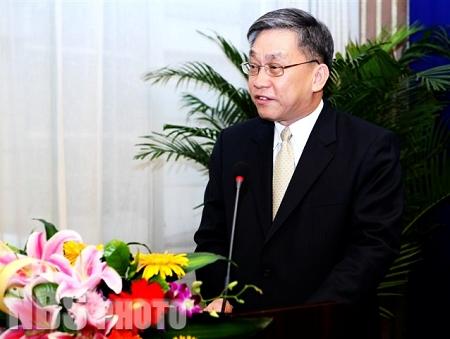|
At the opening ceremony of The International Workshop on From Data to Accounts: Measuring Production in National Accounting jointly by the NBS and the UNSD in Beijing from June 8-12, 2009, Mr. Ma Jiantang, Commissioner of the NBS, announced that Mr. Paul Cheung, Director of UNSD, was appointed as Senior Advisor on Statistics to the NBS, and Mr. Cheung accepted the appointment.
Mr. Ma. Jiantang presenting Mr. Paul Cheung with the Letter of Appointment as Senior Advisor on Statistics to the NBS Biographical note of Professor Paul Cheung Professor Paul Cheung, a national of Singapore, is the Director of the United Nations Statistics Division (UNSD), Department of Economic and Social Affairs at the United Nations Headquarters in New York. In this role, he facilitates the development of the global statistical system and coordinates the work of the United Nations Statistical Commission. He oversees a programme of work that includes the development of international statistical standards, the dissemination of global statistical data, the provision of technical advice to member states in the development of national statistical systems, the coordination of international statistical activities, and the delivery of programme support to the UN System on all statistical matters. Prior to his appointment, Professor Cheung has served as Chief Statistician of the Government of Singapore (1991-2004). In this role, he has been the National Statistical Coordinator as well as the Chief Executive of the Singapore Department of Statistics. Born in Hong Kong, Professor Cheung received his education in Singapore and the United States. He did postgraduate work at the East-West Center, Hawaii, and the University of Michigan, Ann Arbor. He received his PhD in 1983 from the University of Michigan, Ann Arbor, USA. He has taught at the National University of Singapore and Nanyang Technological University for many years since graduation on full or part-time basis. Professor Cheung served as President of the International Association of Official Statistics, (2001-2003). He was the past Chairman of the Governing Board, Statistical Institute of Asia and the Pacific (UN-SIAP), the Chair of the UNESCAP Committee on Statistics, as well as Chairman of the Regional Advisory Board of the Asian Development Bank's International Comparison Program for Asia and the Pacific. Professor Cheung is well known in the Asia and the Pacific region for his pioneering research in the fields of manpower, population, social planning and official statistics. He has written widely in his areas of research. He has received the following national and professional awards:The Von Neumann-Spallart Medal awarded by the International Institute of Statistics (1999); The Public Administration Medal (Gold) Pingat Pentadbiran Awam awarded by the President of the Republic of Singapore (2001); The Honorary Doctorate Degree by the National University of Mongolia (2008).
Paul CheungDirector United Nations Statistics Division(June 8, 2009) Commissioner Ma Jian Tang Thank you very much for your kind words and recognition. It is a great honour for me to be appointed the Senior Advisor on Statistics by the National Bureau of Statistics.I look forward to working with the National Bureau of Statistics to further strengthen the national statistical system of China which has seen tremendous improvements over the years.The successful conduct of the economic, agricultural, and population censuses; the development of a respected statistical organization with a group of dedicated professional staff, and the aspiration for the highest professional standards in your work are excellent examples of your recent achievements. On the strength of a strong Chinese national statistical system, and together with other partners and national statistical systems, I hope to work with you to build a dynamic and effective global statistical system. Commissioner Ma, Colleagues I would like to add my welcome to all of you to the International Workshop on From Data to Accounts: Measuring Production in National Accounting. This workshop is the first of a series of events under the project on strengthening statistical capacity development in China and other developing countries in Asia, funded by the Chinese Government. I would like to express my sincere gratitude to the Chinese Government for its support to the advancement of the global statistical system and to the National Bureau of Statistics for hosting this event.I am particularly grateful to the NBS staff for their hard work in preparing for the workshop. The promotion of international statistical standards and, specifically, work on national accounts has always been high on the agenda of the Statistical Commission and the United Nations Statistics Division (UNSD). It gives particular significance to this workshop that it is conducted after the official endorsement by the Commission of a number of such standards related to the compilation of national accounts, including the GDP by the production approach. During two subsequent sessions the thirty-ninth session in February 2008 and the fortieth session in February 2009, the Commission considered and approved in principle Volume 1 and Volume 2 of the updated System of National Accounts 2008 (2008 SNA). This was the third major update of the national accounts methodology since its first release in 1952. For practical reasons, the 2008 SNA has been produced in two separate volumes. Volume 1 contains details about the broad framework covering the concepts, accounting rules, the accounts and tables, and their integration. Volume 2 elaborates various aspects of the accounts, provides details about their presentation and describes some possible extensions to improve the usefulness of the accounts for a wide range of purposes. Pre-edited white cover versions of Volume 1 and Volume 2 have been released by UNSD in print and online. During its thirty-ninth session in February 2008 the Commission also adopted the International Recommendations for Industrial Statistics 2008 (IRIS 2008) and the International Recommendations for Distributive Trade Statistics 2008 (IRDTS 2008) as the new international standards for industrial and distributive trade statistics respectively. The preparation of these recommendations has been part of an effort by the Statistics Division to strengthen countries methodological and operational foundations for basic economic statistics in an integrated manner, including enhancement of their coherence across different sectors of the economy and conceptual consistency with respect to macroeconomic statistics. Unlike their previous versions, IRIS 2008 and IRDTS 2008 are mutually consistent and fully harmonized with 2008 SNA. I would also like to refer to the most recent revisions of the International Standard Industrial Classification of All Economic Activities (ISIC) Rev.4 and the Central Product Classification (CPC) Ver.2 and changes in definitions of units and treatment of goods sent abroad for processing introduced by these classifications. It is my belief that this workshop provides a good opportunity to present these updated statistical standards and that our future work on national accounts will be guided by implementing them and improving the consistency across countries so that the international comparability of GDP estimates is ensured and fostered. Our objective for the workshop is to enhance the capacity of National Statistical Offices of Asian countries to produce reliable and high quality national accounts estimates from appropriate basic economic data sources. This will be achieved through a comprehensive training on concepts and compilation methods and exchange of practical experience. Due to the fundamental importance of the activity of production in the System of National Accounts, priority is given to the production approach for GDP compilation. The workshop will give a thorough overview of the compilation of value added by industries and address the data and measurement issues of the agricultural, manufacturing and services sectors. Since many economic activities in Asian countries are still carried out in the informal sector, special attention will be devoted to the conceptual framework and data collection for value added measurement of the informal sector. I hope this workshop will further improve and ensure the harmonization of national accounts compilation in Asia, thus contributing to the production of consistent and comparable data. I wish you a successful and fruitful workshop and a pleasant stay in Beijing. Thank you. |
Related News
- Memorandum of Understanding on International Statistical Training and Cooperation Between Chinese Government and United Nations Was Signed in Beijing
- Mr. Li Qiang Attended the Second Session of United Nations ESCAP Committee on Statistics
- Mr. Ma Jiantang Attended the Second BRIC Statistical Commissioners Conference
- Assistant Secretary of United States Department of the Treasury Visited NBS
Photos
More>>trade
- Mr. Ma Jiantang Met with Director-General of CBS
- Mr. Ma Jiantang Met with the President of FSO, Both Sides Gave High Appraisal to
- Mr. Ma Jiantang Participated in the First Meeting of the Global Executive Board
- Mr. Ma Jiantang Participated in Celebrating the 60th Anniversary of Founding of
- "Training Course on National Accounts for the Officials of BBS" was Held in







